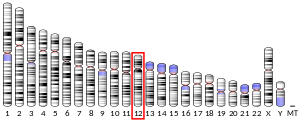Exportin-T is a protein that in humans is encoded by the XPOT gene .[ 5] [ 6] [ 7]
This gene encodes a protein belonging to the RAN-GTPase exportin family that mediates export of tRNA from the nucleus to the cytoplasm. Translocation of tRNA to the cytoplasm occurs once exportin has bound both tRNA and GTP-bound RAN.[ 7]
^ a b c GRCh38: Ensembl release 89: ENSG00000184575 – Ensembl , May 2017^ a b c GRCm38: Ensembl release 89: ENSMUSG00000034667 – Ensembl , May 2017^ "Human PubMed Reference:" . National Center for Biotechnology Information, U.S. National Library of Medicine .^ "Mouse PubMed Reference:" . National Center for Biotechnology Information, U.S. National Library of Medicine .^ Kutay U, Lipowsky G, Izaurralde E, Bischoff FR, Schwarzmaier P, Hartmann E, Gorlich D (Jul 1998). "Identification of a tRNA-specific nuclear export receptor" . Mol Cell . 1 (3): 359– 69. doi :10.1016/S1097-2765(00)80036-2 PMID 9660920 . ^ Arts GJ, Fornerod M, Mattaj IW (May 1998). "Identification of a nuclear export receptor for tRNA" . Curr Biol . 8 (6): 305– 14. doi :10.1016/S0960-9822(98)70130-7 PMID 9512417 . S2CID 17803674 . ^ a b "Entrez Gene: XPOT exportin, tRNA (nuclear export receptor for tRNAs)" .
Arts GJ, Kuersten S, Romby P, et al. (1999). "The role of exportin-t in selective nuclear export of mature tRNAs" . EMBO J . 17 (24): 7430– 41. doi :10.1093/emboj/17.24.7430 . PMC 1171087 PMID 9857198 . Kruse C, Willkomm DK, Grünweller A, et al. (2000). "Export and transport of tRNA are coupled to a multi-protein complex" . Biochem. J . 346 (1): 107– 15. doi :10.1042/0264-6021:3460107 . PMC 1220829 PMID 10657246 . Kutay U, Hartmann E, Treichel N, et al. (2001). "Identification of two novel RanGTP-binding proteins belonging to the importin beta superfamily" . J. Biol. Chem . 275 (51): 40163– 8. doi :10.1074/jbc.M006242200 hdl :11858/00-001M-0000-0015-3D4E-B PMID 11024021 . Kuersten S, Arts GJ, Walther TC, et al. (2002). "Steady-state nuclear localization of exportin-t involves RanGTP binding and two distinct nuclear pore complex interaction domains" . Mol. Cell. Biol . 22 (16): 5708– 20. doi :10.1128/MCB.22.16.5708-5720.2002 . PMC 133969 PMID 12138183 . Strausberg RL, Feingold EA, Grouse LH, et al. (2003). "Generation and initial analysis of more than 15,000 full-length human and mouse cDNA sequences" . Proc. Natl. Acad. Sci. U.S.A . 99 (26): 16899– 903. Bibcode :2002PNAS...9916899M . doi :10.1073/pnas.242603899 PMC 139241 PMID 12477932 . Gerhard DS, Wagner L, Feingold EA, et al. (2004). "The status, quality, and expansion of the NIH full-length cDNA project: the Mammalian Gene Collection (MGC)" . Genome Res . 14 (10B): 2121– 7. doi :10.1101/gr.2596504 . PMC 528928 PMID 15489334 . Suzuki T, Koyama Y, Hayakawa S, et al. (2006). "1,25-Dihydroxyvitamin D3 suppresses exportin expression in human promyelocytic leukemia HL-60 cells" . Biomed. Res . 27 (2): 89– 92. doi :10.2220/biomedres.27.89 PMID 16707848 . Li S, Sprinzl M (2007). "Interaction of immobilized human exportin-t with calf liver tRNA" . RNA Biol . 3 (4): 145– 9. doi :10.4161/rna.3.4.3679 PMID 17224653 .




